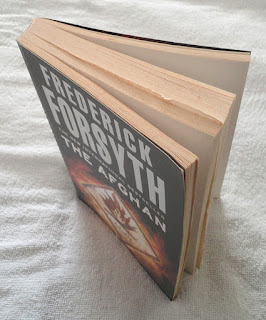Much
of what happens at this blog is about the incredible stupidity of the customers
and clients of booksellers; however, don’t let that lead you to think that
booksellers are all salt-of-the-earth, straight-shooters. No. Not by a long
shot. In the last week I ran into a bookselling practise that is highly
annoying, not to say illegal, and so I thought I’d bring it to your attention.
Let
me explain by telling you of the time I first encountered this sin. I was in
the new Sydney-central bookshop of a long-time bookdealer, who I will not name
due to the fact that I would get into a lot of trouble, but whose actions,
which I’m about to disclose, would surprise no-one who had dealt with her in
the past, eminent ABA and ANZAAB member though she be. I found a book in her
shop that I wanted to purchase: it was clearly priced at $12 and in nice
condition and I thought it would make a nice addition to my collection. I took
it to the front counter and signalled the drone there of my intention to
purchase.
Suddenly,
the proprietor of the store swooped over and snatched the book from my hands.
She flicked through it and then announced: “I’m sorry – this volume has been
withdrawn from sale”, before marching off to her back office. The drone just shrugged,
indicating not only that he could do nothing on my behalf, but that this was a
common occurrence.
Seriously
miffed, I re-pocketed my wallet and headed for the door. As I made my exit the
shop-owner appeared beside me and casually waved the book at me in a manner
that suggested I had just put her to some inconvenience. “You can buy it now if
you want,” she declared.
In response I simply stared at her, in as cold a fashion as I could muster up, and
closed the door firmly in her face.
Some
of you might not be getting the sub-text of what was happening here, so let me
fill you in. Having seen my interest and clocked the monetary value of this
potential transaction, the ‘bookdealer’ took the book away so that she could
rummage about a little on teh interwebz and make sure that she wasn’t losing
out on the deal. Having reassured herself that the price she’d decided to sell
the book for was fair and accurate, she then ungraciously decided that I could
go ahead and reward her impolitic behaviour by throwing $12 her way. Let me
just say this – it’s illegal to operate this way. If you are going to sell a
book, you are required to do your research before
you price it and put it out for sale. You are not allowed to stop the
transaction mid-sale and alter the terms of the deal.
Now,
everyone makes mistakes. The world of books is wide-ranging and multifarious;
we dealers are trying to anticipate the tastes and requirements of every kind
of reader from Austen fans to World War Two history buffs. No-one can cover all
the bases with total accuracy, and occasionally a book worth hundreds can be
let go for a pittance – it happens all the time and to the best of us. I recall
the first UK edition of William Burrough’s The
Naked Lunch - signed by Burroughs and dedicated to Jasper Johns at the
venue of the book’s launch which Johns had organised - which I found at a
fellow-dealer’s shop. They had it priced at $5. After a quick consultation,
that book is now being sold on commission for them by the store where I work
for $500. These slip-ups happen all the time and the lucky punter who wins out
in the deal will ever-after recall the transaction as a high point in their
collecting career.
So
let me tell you about last week. I had to get some new tyres for my car and, while at the dealership, I noticed that there was a little antique shop
next-door. I made a decision to return and check them out. As I walked in, I
was amazed to see books everywhere and my eyes lit upon about half-a-dozen
volumes in the first few minutes which were highly desirable. I opened one of
them and found an enigma: there was no price. Nothing written in the book; no
sticker on the covers. I looked around for some kind of notice which would
explain their pricing strategy and saw only a sign which read: “Any prices inside the books are not
necessarily the asking price of the establishment”. Those of you up on your
retail law, will know that this is illegal – goods for sale should be priced;
if there are numerous price tags on an item, the lowest one prevails.
I
swanned around the rest of the shop: everything else in the place, from antique
ceiling mouldings, to secondhand coats was clearly priced and labelled. Even
the vinyl records were clearly labelled: LPs $10; singles $5. It was just the
books. Inevitably, I found something which I just had to have – a rare edition
of a book on H.P. Lovecraft by the Borgo Press. Anticipating a repeat of the
scenario which I’d experienced as outlined above, I signalled my intention to
buy to the twenty-something drone at the front desk. What happened next
surprised me:
“Oh,
this is Lovecraft,” said the cipher, “Rex must have missed it while he was
looking around. I’m afraid I can’t sell it to you.”
Annoyed,
I declared that Rex’s oversight was surely to my advantage and asked again -
how much?
“Sorry,”
was the response, “this is Rex’s book.” And it vanished into a desk drawer.
Seriously
annoyed, I asked him to outline the store policy regarding their book stock.
The non-answer I received was as vague and equivocal as I could have expected.
I mentioned this incident to a colleague shortly afterwards and learned that
they’d been served the same heap of crap: they’d asked to buy an incomplete limited
edition set of Burton’s The Arabian
Nights and a price had been agreed upon. Suddenly one of the proprietor’s
friends had piped up from behind a nearby computer saying “Dude! Those books’re
worth thousands!”, and the deal stopped dead in its tracks. Now the price
agreed upon by my friend was entirely fair – the set was worn and – significantly
– missing two volumes; these sets are numbered, so losing a volume
catastrophically causes the value to plummet. However, when these millennial “booksellers”
jump online and look up something on ABEBooks, they see only dollar signs: they
have no idea about accurate pricing and assessing book descriptions, and no
notion at all about the damage that bookjackers cause in the rare book market.
These kids mistakenly think that they’re sitting on a gold mine while making up
prices on the spot via the Internet. Illegally.
That
set of The Arabian Nights is still
there by the way; it was one of the books that I’d clocked as I walked in. All the
other good books are still there too, and it’s easy to see why – no punter is
going to lay down their hard-earned on something that has no up-front price, in
a deal that might change drastically in a heartbeat. So if you’re in Katoomba
getting your tyres rotated at the K-Mart
Tyre and Auto Service on Bathurst Road, and you see the quaint old building
next door with the sign out the front saying “Antiques”, don’t be fooled – avoid it like the plague that it is.

























